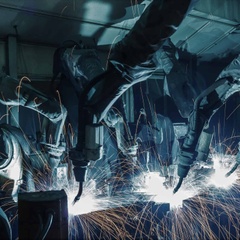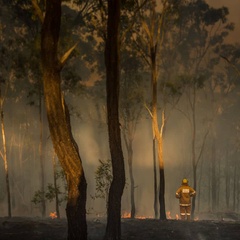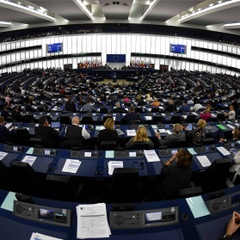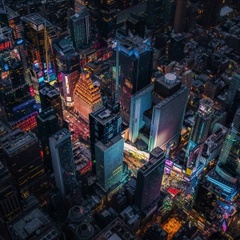
The Center for the Governance of Change has collaborated with The History Channel in the making of A History of the Future, a 2019 documentary series written and hosted by Professor Diego Rubio, Executive Director of the Center. The series comprises four episodes, each of which explores one key aspect of society’s future (work, democracy, globalization and climate) by analyzing past precedents and modern data, and projecting historical trends.
The series has been the most ambitious production of History Channel Iberia to date, and it was commissioned to commemorate the 20th anniversary of the channel. The filming and editing was carried out by Onza Entertainment, one of the most prestigious studios in Spain, creator of historical series such as The Ministry of Time (TVE and Netflix) and Hernán (Amazon Prime Video). A 30-people team worked for more than a year, travelled extensively, examined hundreds of hours of archival footage, and processed several modern 4K images filmed across the five continents.
The series features interviews with 19 leading academics.
The first episode premiered on the History Channel on December 2019 in Spanish and Portuguese. The English version will be aired in early 2020.
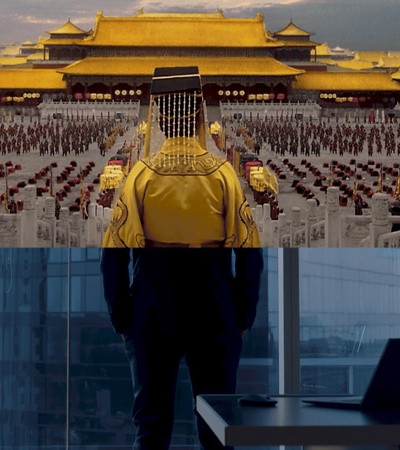
EPISODE 1: THE FUTURE OF WORK
This first episode starts in the city of Istanbul. Rubio examines the story of the first Arabic printing press, banned by Ottoman emperors for four centuries to prevent the destruction of jobs. The episode then analyzes how the rulers of various other time periods tried to curb technological innovation throughout history, until the nineteenth century when the British government unleashed automation and sparked the First Industrial Revolution. Rubio examines the "Engels Pause" that subsequently occurred (precariousness and impoverishment of workers) and compares it to the situation of many developed countries today. He shows how technological change has affected people in the past, for better or worse, and speculates about how it will affect citizens in the next few decades. According to Rubio, in the digital age, “it is not the future of work, but the future of workers, that is at stake.”
EPISODE 2: THE FUTURE OF CLIMATE
This episode begins at the slopes of Mount Tambora (Indonesia), where a devastating 1815 eruption altered the planet’s average temperature by 2 degrees, and caused several natural and social catastrophes throughout the northern hemisphere. Using this and other historical precedents, Rubio speculates about the catastrophic effects that a similar thermic alternation (anticipated by most scientists) could have in the coming decades. The episode travels to countries such as Algeria, Brazil, Egypt, Russia, Switzerland, the UK, and the US. It shows some of the history’s worst droughts, floods, and pandemics, instances which, according to Rubio, demonstrate the fragility of societies in the face of climate change. The episode also examines, however, how the successful banning of CFCs to counter the hole in the ozone layer illustrates humanity’s ability to face major systemic challenges.
EPISODE 3: THE FUTURE OF DEMOCRACY
This episode documents the ongoing crisis of democracy and explores the strengths and weaknesses of some of the technological and autocratic alternatives that aspire to replace it. It starts in ancient Greece, and then travels to Corsica (birthplace of the first modern democracy), Germany, and China. Using Hitler's rise to power as an example, Rubio explains how many modern democracies are being dismantled from within by illiberal politicians who use the polls to seize power. He then examines the peculiarities of the Chinese autocratic system and the possibility that an Artificial Intelligence may end up ruling the West. The episode highlights the virtues of democracy, but also emphasizes the urgent need to modernize it.
EPISODE 4: THE FUTURE OF GLOBALIZATION
The last episode explores the profound changes affecting the global order due to the rise of China and anti-globalization movements. Rubio begins his narration in the Chinese Imperial Palace of Chengde, and tells the story of the 1793 Macartney Embassy to illustrate Asia’s power in the past. Then, he examines the evolution of the world’s economic center of gravity over the past two millennia, to show that China's hegemony is not an anomaly but a return to normalcy. Through the historical perspective, Rubio analyzes the effects that the New Silk Road will have on globalization, the possibility of a war between the United States and China, and the unfolding migration crisis.
FEATURED EXPERTS
The series features interviews with 18 leading academics, including historians, scientists, political scientists, and technology experts of eight different nationalities, currently working for institutions such as the United Nations and the OECD, and universities like Oxford, Harvard, MIT, IE, Yale, and the London School of Economics.

